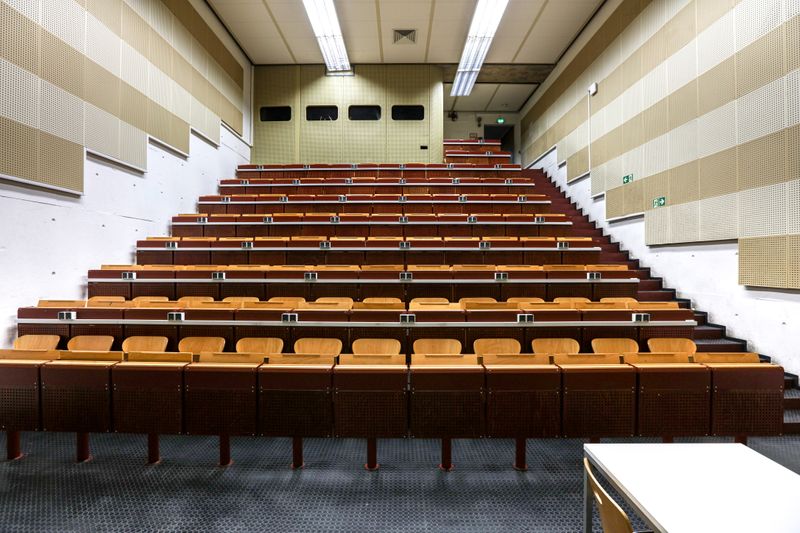This is a lecture hall.
You'll spend countless hours here listening to professors talking from the podium or reading from a PowerPoint presentation. Some of these lectures will be fun and others...
...not so much.
Lecture-based learning is your new reality whether you like it or not!
This means you'll have to learn differently than you did in high school and develop new study skills.
Before Class
1. Do your readings
Being familiar with the material before the lecture will help you connect new information to your prior knowledge. Also, it'll make following the lecture easier!
It’s either that or you’ll have to read hundreds of un-opened pages before an exam.
2. Have a list of questions ready
Ask your professor to clarify any questions you have from the previous class or the readings while your knowledge is still fresh! The semester will get easier if you fix problems as they arise.
Extra points: You’ll have one happy professor!
3. Review your notes
Every class will build on the previous one. Take five minutes before a lecture and review your notes from the previous class to provide a foundation for the new material.
Your long-term memory will thank you!

During Class
4. Take Notes
Taking good notes helps you actively listen, comprehend the material, and retain it longer.
How to master the art of note-taking:
Pick a style and be consistent (typing or hand-writing, abbreviations, visual organizers etc.)
Develop your shorthand to save time
Focus on the main ideas of the lecture instead of noting everything
Record questions or unclear points as you listen

5. Ask questions
Use the time your professors give for a Q&A. If there's no time, consider talking to them after class for clarification.
But remember:
It takes time and practice to overcome the fear of appearing dumb when you ask a question. The material is unfamiliar to your peers as well so you're not alone!
If you fail to ask questions when you need clarification, there will be gaps in your knowledge. The more you avoid questions, the harder class will get!
Quiz
You're attending a history lecture. How should you take notes?
After Class
6. Review your notes
You need to get the knowledge from the lecture into your long-term memory so that you can remember it later.
Reviewing your notes for at least ten minutes will ensure that you truly learn the lecture's main points and save you hours of study later.

 7. Check your understanding
7. Check your understanding
While reviewing your notes, identify:
any important points you couldn't note down during the lecture
confusing or unclear points from the lecture
If you're still unclear...
...Ask for help!
attend your professor's office hours
talk to your teaching assistant if you have one
exchange notes with classmates
Take Action

It's hard to change your study habits! Always keep in mind:
Your feedback matters to us.
This Byte helped me better understand the topic.



